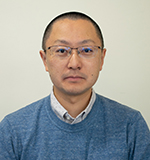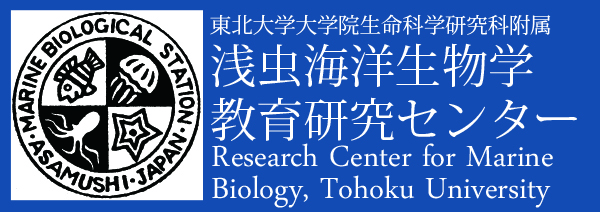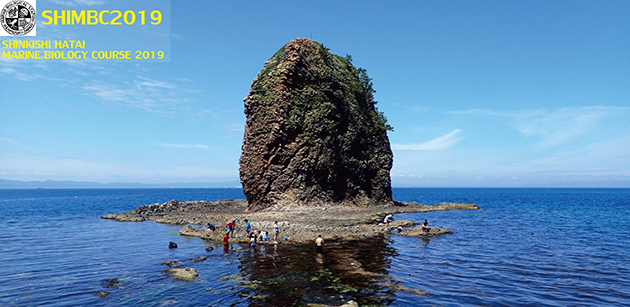Last update: 27th Feb 2019
We are delighted to announce that the Shinkishi Hatai International Marine Biology Course 2019 will be held at the Research Center for Marine Biology (RCMB), Tohoku University, Asamushi, Aomori, Japan from 18th–24th July 2019.
DOWNLOAD SHIMBC2019 POSTER
Who is Shinkishi Hatai?
See previous international courses: SHIMBC2017 & International course in 2015
Overview
A marine biology station is the ideal environment to observe live marine organisms and to begin studying marine biology. The marine biology course held at our marine biology station, RCMB, on the coast of Mutsu Bay, provides hands-on experience in handling marine organisms (ascidians) and exploring the diversity of the often-overlooked invertebrate taxa living in the sand interstices (meiobenthos). The first half of the course will introduce the participants to two fields, developmental biology of ascidians and meiobenthology. In the latter half of the course, participants will conduct projects supervised by instructors of each field, and their results will be presented on the last day. Specific projects will be arranged prior to the course.
Instructors & Projects
Course in Meiobenthology

Instructors: Drs.Reinhardt Møbjerg Kristensen(University of Copenhagen) & Shinta Fujimoto (RCMB)
Project detail (in prep): The marine environment harbours diverse organisms with various modes of life. This course aims to introduce a group of organisms known as meiobenthos to the participants. Meiobenthos is often overlooked due to its small body size (mostly less than a millimetre), but contrary to this state, its biodiversity and biomass are non-negligible and is stimulating studies on evolution and ecology. The one day introductory course (19th July) focuses on acquiring the basic methods of how to collect, extract, find and observe these fascinating organisms around RCMB. All common extraction techniques (decantation, freshwater shock, bubble-and-blot, floatation, MgCl2 anaesthesia, and seawater ice) will be demonstrated. The advanced course (21th & 22th July) will expand the sampling to more localities with different environment and try to grasp a better picture of diversity and also learn how to identify them. For the advanced course, we welcome participants’ requests on what they are especially interested in (e.g. specific organism, field of study, and on). Upon request, we may be able to prepare a mini-project that the participant would be interested in working on.
Developmental Biology of Ascidians

Instructor: Dr.Alexander McDougall(Developmental Biology Laboratory, Villefranche-sur-mer)
Supporting RCMB staff: Dr. Ayaki Nakamoto
Project detail:
Introductory course (20th July): Handling of gametes and observation of ascidian embryos
Advanced course (21st to 22nd): Regulation of cell divisions and cell cycles during early development
Keynote Lecture

Origins and Evolution of Marine Invertebrate Larvae
Lecturer: Dr. Hiroaki Nakano (Shimoda Marine Research Center, University of Tsukuba)
Many marine invertebrate animals possess free-swimming larvae, with the
larval morphology, behavior, and ecology showing a wide diversity within
the metazoans. However, the origins and evolution of these marine invertebrate
larvae are not well understood. It is still not known if the dipleurula-type
larvae of deuterostomes and trochophore larvae of protostomes are homologous
larval stages, or if they have any evolutionary relationships with the
free-swimming larvae seen in sponges and cnidarians. One of the major reasons
for these problems remaining unsolved is the lack of developmental data
for some animal groups that occupy very crucial phylogenetic positions.
In this lecture, I will talk about developmental research on Metacrinus
rotundus (Echinodermata) and Xenoturbella bocki (Xenacoelomorpha). Furthermore,
I would like to introduce the ongoing research on Trichoplax sp. (Placozoa).
Venue
Research Center for Marine Biology, Tohoku University Click here for detail
Schedule
18th July:
Registration
15:30 Keynote lecture "Origins and Evolution of Marine Invertebrate
Larvae" by Dr. Hiroaki Nakano
18:00 Welcome reception
19th July: “Course in Meiobenthology” by Drs. R.M. Kristensen and S. Fujimoto
Lecture & lab work
20th July:“Regulation of cell divisions and cell cycles during early development”
by Dr. A. McDougall
Lecture & lab work
21–22th July: Advanced courses for each project
23th July:
15:00 Presentations of each project
18:00 Farewell party
24th July:
Leaving Asamushi
Qualification
The course is open for undergraduate and graduate students (approx. 15
in total) from any institute, who major in or have an interest in biology
and related fields. If the number of applicants exceeds our hosting capacity,
we may have to decline applications. Experience in handling marine animals
is not necessary. Accommodations and meals are available at a reasonable
rate at the center’s dormitory (Click here for detail). We are unable to support your travel expenses.
Registration
1. Please send an e-mail to the following address with your intention to
participate in the course and the specific project you want to participate
in by 31st March 2019*. An early notice of your intention to participate will optimize preparing
for individual projects.
E-mail address: shimbc2019(at)grp.tohoku.ac.jp [Please change (at) to @]
(*) For Tohoku University members, the application deadline is 30th April
2019.
2. When we receive your e-mail, we will send an application form with additional
information about the course, accommodations, and so on.
Organizing committee
Dr. Takuya Minokawa (Chair person)
Dr. Gaku Kumano
Dr. Shinta Fujimoto
This program is supported by the Ministry of Education, Culture, Sports,
Science and Technology in Japan.

